For backpackers seeking stunning natural landscapes and challenging trails, backpacing in Georgia is a destination that should not be missed.
With its towering peaks and crystal-clear lakes, the state offers a wide array of backpacking opportunities for adventurers of all levels.
Contents
Whether you’re looking for a quick day hike or a multi-day wilderness excursion, Georgia’s backpacking trails will not disappoint.
From North Georgia’s mountain landscapes to the iconic Appalachian Trail and state parks like Amicalola Falls and Cloudland Canyon, backpackers will find plenty of options to explore.
With moderate temperatures and picturesque scenery year-round, Georgia is an ideal destination for backpacking enthusiasts.
Key Takeaways
- Georgia offers a multitude of backpacking opportunities for adventurers of all levels
- Popular destinations for backpacking include North Georgia, the Appalachian Trail, and state parks like Amicalola Falls and Cloudland Canyon
- The state’s moderate temperatures and stunning scenery make it an ideal destination for backpacking year-round
- Georgia’s backpacking trails offer a range of challenges, from quick day hikes to multi-day wilderness excursions
- For those seeking adventure beyond Georgia’s borders, nearby countries like Armenia and Azerbaijan offer additional backpacking options
Exploring Georgia’s Backpacking Trails
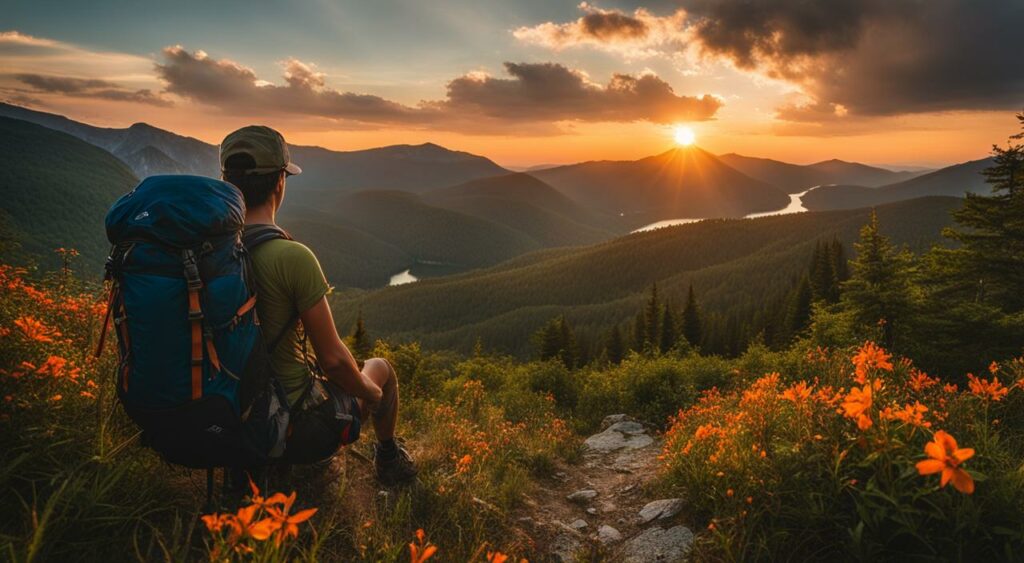
Georgia offers numerous backpacking trails for adventurers to explore. From beginner-friendly day hikes to multi-day wilderness treks, the state has it all. Below are some of the best backpacking trails in Georgia:
| Trail Name | Distance | Difficulty Level |
|---|---|---|
| Anna Ruby Falls | 4.6 miles | Moderate |
| Cloudland Canyon | 6 miles | Moderate to Difficult |
| Appalachian Trail | 79 miles in Georgia | Moderate to Difficult |
| Chattahoochee-Oconee National Forest | Over 850 miles of trails | Varies |
All of these trails offer stunning views and a chance to immerse oneself in Georgia’s natural beauty.
However, it’s important to note that some trails may require permits or have limited access during certain times of the year.
When planning a backpacking trip in Georgia, it’s essential to research the trail beforehand and bring appropriate gear.
Temperatures can vary, so it’s always a good idea to pack layers, especially for overnight trips. Additionally, be sure to bring enough food and water for the duration of the hike.
Overall, hiking and backpacking in Georgia is an incredibly rewarding experience. The state’s diverse landscapes and well-maintained trails make it an ideal destination for both beginner and experienced backpackers.
“Georgia has some of the best backpacking trails in the Southeast. From scenic waterfalls to challenging mountain treks, backpackers will find plenty to explore in this beautiful state.” – Georgia State Parks
North Georgia Backpacking: A Paradise for Outdoor Enthusiasts

North Georgia is a backpacking enthusiast’s paradise.
With its stunning mountain landscapes, state parks, and hiking trails, it’s no wonder why this region attracts thousands of hikers and backpackers each year.
One of the most popular trails in North Georgia is the Appalachian Trail.
The trail passes through the Chattahoochee-Oconee National Forest, offering backpackers a chance to experience a portion of this iconic long-distance trail.
Along the way, hikers can explore scenic waterfalls and breathtaking views of the North Georgia Mountains.
For those seeking shorter trails, there are several state parks in the area that offer excellent backpacking opportunities.
The Amicalola Falls State Park is a favorite among backpackers, with its cascading waterfalls and scenic trails.
Cloudland Canyon State Park is another popular destination for backpackers, featuring a variety of trails, including the challenging West Rim Trail.
North Georgia Backpacking Trails
Below is a table highlighting some of the best backpacking trails in North Georgia:
| Trail Name | Distance | Difficulty | Highlights |
|---|---|---|---|
| Blood Mountain Loop | 5.5 miles | Moderate | Summit views, Appalachian Trail |
| Brasstown Bald and Jacks Knob | 10.5 miles | Difficult | Highest peak in Georgia, Appalachian Trail |
| Panther Creek Trail | 7 miles | Moderate | Waterfalls, swimming holes |
Planning Your North Georgia Backpacking Trip
As with any backpacking trip, it’s important to plan ahead. Here are a few tips to help you plan your North Georgia backpacking adventure:
- Research the trails you want to hike and download trail maps
- Check the weather forecast and pack accordingly
- Make sure you have proper gear, including a tent, sleeping bag, and cooking supplies
- Bring plenty of water and snacks
- Let someone know your itinerary and expected return date
Discovering Georgia’s Natural Wonders: Anna Ruby Falls and Cloudland Canyon Park
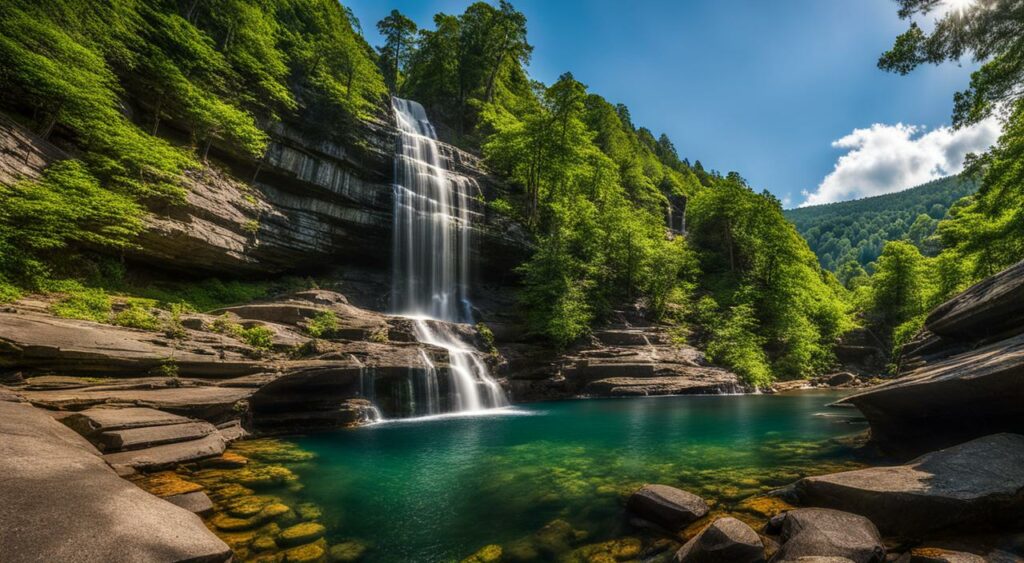
For backpacking enthusiasts in Georgia, Anna Ruby Falls and Cloudland Canyon Park are two must-visit destinations.
Both offer stunning natural landscapes and a myriad of hiking and backpacking opportunities. Anna Ruby Falls is a breathtaking waterfall located near Helen, Georgia.
The falls are fed by two creeks, Curtis and York, and offer a scenic backdrop for hiking and backpacking.
The trailhead for Anna Ruby Falls is located at the Chattahoochee National Forest, and there are several hiking options available to visitors.
The most popular route is the Anna Ruby Falls Trail, which is a moderate 1-mile hike that takes visitors to the base of the falls.
For a more challenging hike, visitors can take the Smith Creek Trail, a 4.6-mile loop through the forest that passes by several cascading waterfalls before reaching Anna Ruby Falls.
Cloudland Canyon Park is another exceptional natural wonder in Georgia that draws hikers and backpackers alike.
The park is located on the western edge of Lookout Mountain and offers stunning views of the surrounding valleys and canyons.
The park features over 30 miles of hiking trails, including the popular Waterfalls Trail, which takes visitors on a hike to two beautiful waterfalls, Hemlock Falls and Cherokee Falls.
For those seeking a more challenging backpacking experience.
The West Rim Trail is a strenuous 6.5-mile trek that offers stunning views of the canyon and has several backcountry campsites along the way.
Hiking and Backpacking Tips
- Wear appropriate hiking and backpacking gear, including sturdy shoes, sunscreen, and insect repellent.
- Carry plenty of water and snacks, and stay hydrated throughout the hike.
- Be mindful of the weather conditions and plan accordingly.
- Use caution when encountering wildlife and keep a safe distance.
- Follow Leave No Trace principles and pack out all trash and litter.
Anna Ruby Falls and Cloudland Canyon Park are two of Georgia’s most iconic natural wonders.
With their breathtaking scenery and hiking opportunities, they are must-visit destinations for backpackers in the state.
Embarking on the Appalachian Trail: Georgia’s Scenic Masterpiece
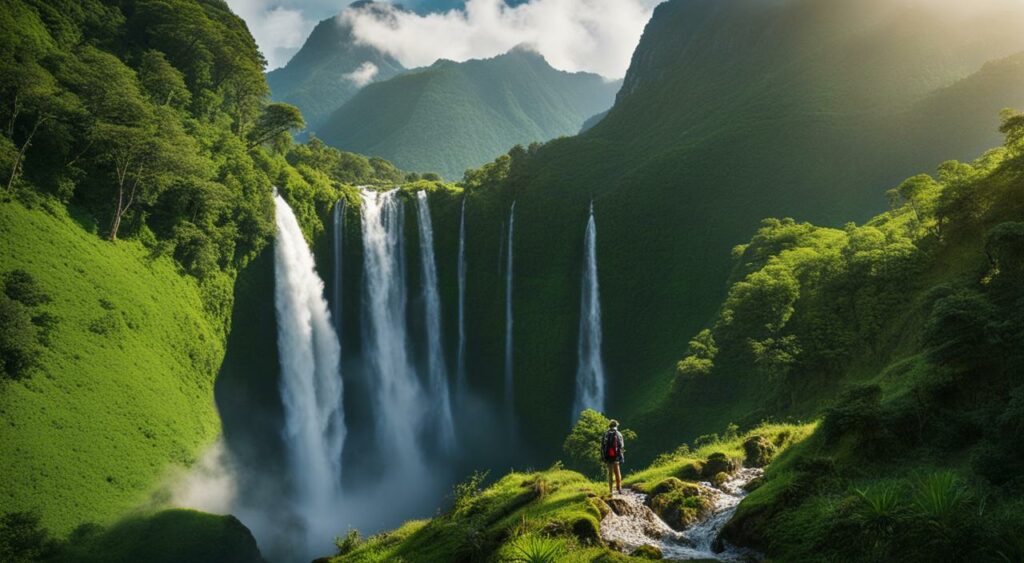
The Appalachian Trail, a famous long-distance trail in the eastern United States, spans over 2,000 miles and passes through 14 states.
Georgia is home to a portion of this iconic trail, offering backpackers the chance to experience some of the trail’s beauty and variety in hiking terrain.
The Appalachian Trail in Georgia is known for its stunning waterfalls, breathtaking views, and challenging terrain.
One of the most notable falls is Amicalola Falls, which serves as the trailhead for the southern terminus of the trail.
This magnificent waterfall is over 700 feet tall and features a 600-step staircase for visitors to enjoy a close-up view of the falls.
The trail offers a range of hiking opportunities, from easy day hikes to more challenging multi-day backpacking trips.
Some of the most popular hiking trails include the hike up to Springer Mountain, Blood Mountain, and Tray Mountain.
These hikes offer stunning vistas and breathtaking views of the surrounding mountain ranges, making them a must-do for any backpacker.
Backpackers embarking on the Appalachian Trail in Georgia should be prepared for steep climbs, rocky terrain, and occasional wildlife encounters.
It is important to pack appropriately and carry enough water and food for the duration of the hike.
Additionally, backpackers should be aware of the regulations and guidelines set forth by the National Park Service, which manages large portions of the trail.
State Park Adventures: Backpacking in Georgia’s State Parks
Georgia is home to numerous state parks that offer unparalleled natural beauty and excellent opportunities for backpacking.
The state’s North Georgia region, in particular, boasts a plethora of state parks that are perfect for hikers and backpackers alike.
Some of the best state parks in North Georgia for backpacking include:
| State Park | Location | Notable Features |
|---|---|---|
| Amicalola Falls State Park | Dawsonville, GA |
|
| Black Rock Mountain State Park | Mounain City, GA |
|
| Cloudland Canyon State Park | Rising Fawn, GA |
|
These state parks offer diverse landscapes, from waterfalls and canyons to high elevations with stunning views.
Backpackers can find trails with varying degrees of difficulty, making these parks accessible to hikers of all skill levels.
Additionally, the state parks in North Georgia offer a range of camping options for backpackers, from primitive campsites to more developed areas with restrooms and water sources.
Backpackers should be sure to check availability and reservations in advance, as these campsites can fill up quickly during peak season.
Overall, Georgia’s state parks provide backpackers with the chance to immerse themselves in some of the state’s most beautiful natural areas.
Visitors can explore the majesty of the state’s waterfalls, mountains, and canyons while challenging themselves with various trails and camping experiences.
Planning Your Georgia Backpacking Adventure
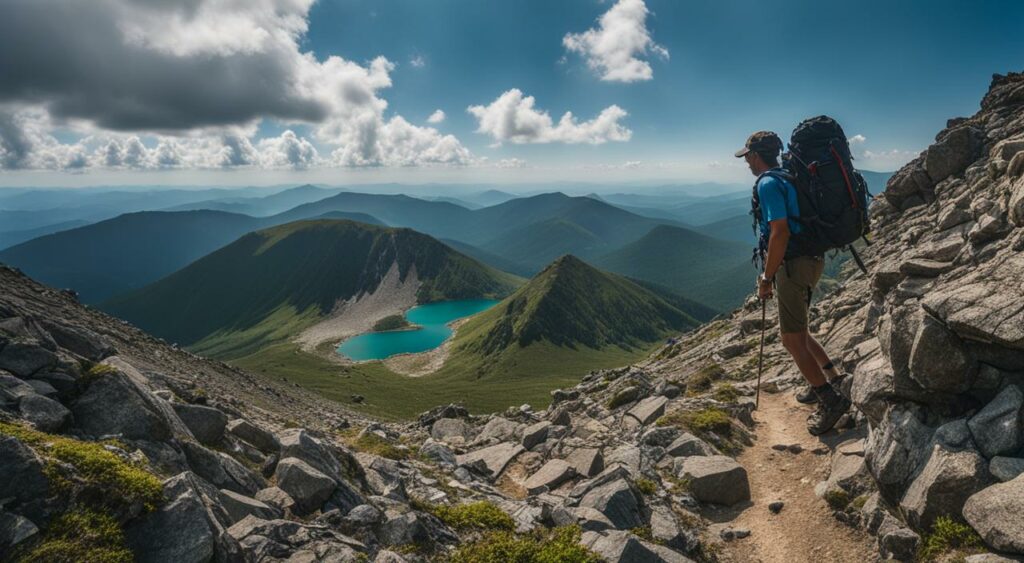
Planning a backpacking adventure in Georgia requires careful consideration of various factors. With numerous trails and outdoor destinations, it can be challenging to decide where to begin.
The following guide provides essential tips and resources for planning your backpacking trip in Georgia.
Explore Georgia Hiking Maps
One of the first steps in planning your backpacking adventure in Georgia is to research the available hiking maps.
The Georgia Department of Natural Resources provides an online map of the state’s trails, including those in state parks and forests.
These maps offer detailed information on trail length, difficulty level, and available amenities.
Driving Directions
When planning your backpacking trip, it is essential to consider driving directions to the trailhead.
Some trails may be located in remote areas, and it is crucial to ensure you have a clear understanding of the driving route before embarking on your journey.
Trail Reviews
Before starting your backpacking adventure, it can be helpful to read reviews of the trails you are considering.
This can provide insights into the trail’s condition, difficulty level, and any potential hazards.
Websites like AllTrails and Hiking Project offer user-generated reviews and photos of hiking trails in Georgia, making it easier to choose the right trail for your adventure.
Georgia Backpacking Guide
For a comprehensive guide to backpacking in Georgia, consider purchasing a guidebook.
Falcon Guides offers a guide to backpacking in Georgia, complete with detailed trail descriptions, maps, and essential information on camping and hiking safety.
Online Resources
There are numerous online resources available to help plan your backpacking adventure in Georgia.
The Georgia State Parks website is an excellent resource for information on state park trails, as well as camping and lodging options.
The Explore Georgia website offers information on various outdoor activities, including backpacking, hiking, and camping.
Table: Top Georgia Backpacking Trails
| Trail Name | Location | Mileage | Difficulty Level |
|---|---|---|---|
| Cohutta Wilderness Loop | Chattahoochee-Oconee National Forest | 14.8 miles | Difficult |
| Chattooga River Trail | Chattahoochee-Oconee National Forest | 15.3 miles | Moderate |
| Appalachian Trail: Georgia Section | North Georgia Mountains | 79.8 miles | Difficult |
| Brasstown Bald-Towns Creek Loop | Chattahoochee-Oconee National Forest | 11.5 miles | Moderate |
| Panther Creek Trail | Chattahoochee-Oconee National Forest | 7.2 miles | Moderate |
Backpacking in Georgia: Tips and Recommendations
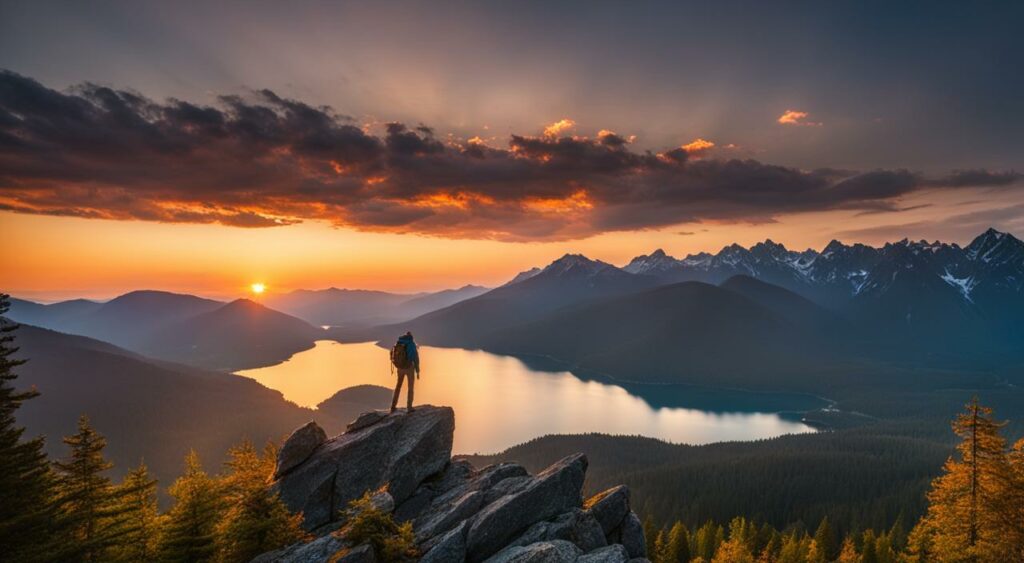
Backpacking can be an incredibly fulfilling experience, but it’s important to plan ahead to ensure a safe and enjoyable trip. Here are some tips and recommendations for backpackers in Georgia:
Essential Gear for Backpackers
Backpackers need to be well-equipped to handle the demands of the wilderness. Some essential items to pack include:
- Tent and sleeping bag
- Cooking supplies and food (pack out all trash)
- Water filter and hydration system
- First aid kit
- Navigation tools (map and compass, GPS device)
- Headlamp or flashlight (with extra batteries)
- Emergency shelter (tarp or bivy sack)
- Multi-tool or knife
- Personal protective equipment (sunscreen, insect repellent, etc.)
It’s also important to dress in layers and to wear sturdy, comfortable hiking boots or shoes.
Safety Tips for Backpackers
When backpacking in Georgia, it’s important to prioritize safety. Here are some tips to keep in mind:
- Research trail conditions ahead of time and adjust plans as necessary
- Never hike alone and always tell someone your itinerary
- Carry a whistle or other signaling device
- Be prepared for inclement weather and know how to react in case of an emergency
- Stay on designated trails and be mindful of wildlife
- Properly store food and other scented items to avoid attracting bears or other animals
- Leave no trace: pack out all trash and dispose of waste properly
Exploring Atlanta and Tbilisi
For backpackers looking to take a break from the wilderness, the cities of Atlanta and Tbilisi offer a wealth of cultural and culinary experiences.
In Atlanta, visitors can explore the Georgia Aquarium, the Martin Luther King Jr. National Historical Park, and the High Museum of Art.
In Tbilisi, highlights include the Narikala Fortress, the Bridge of Peace, and the Georgian National Museum.
Stay Up to Date with the Latest Travel News
Whether you’re traveling to Georgia from afar or are a local resident planning a backpacking excursion, it’s important to stay informed about travel restrictions, weather forecasts, and other relevant news.
Check out local news sources and travel websites for the most up-to-date information.
“Georgia is a beautiful state with so much to offer outdoor enthusiasts,” says John, an experienced backpacker and travel writer. “Just be sure to plan ahead and take the necessary precautions to stay safe and comfortable.”
Best Overnight Backpacking in Georgia: Unforgettable Multi-Day Adventures
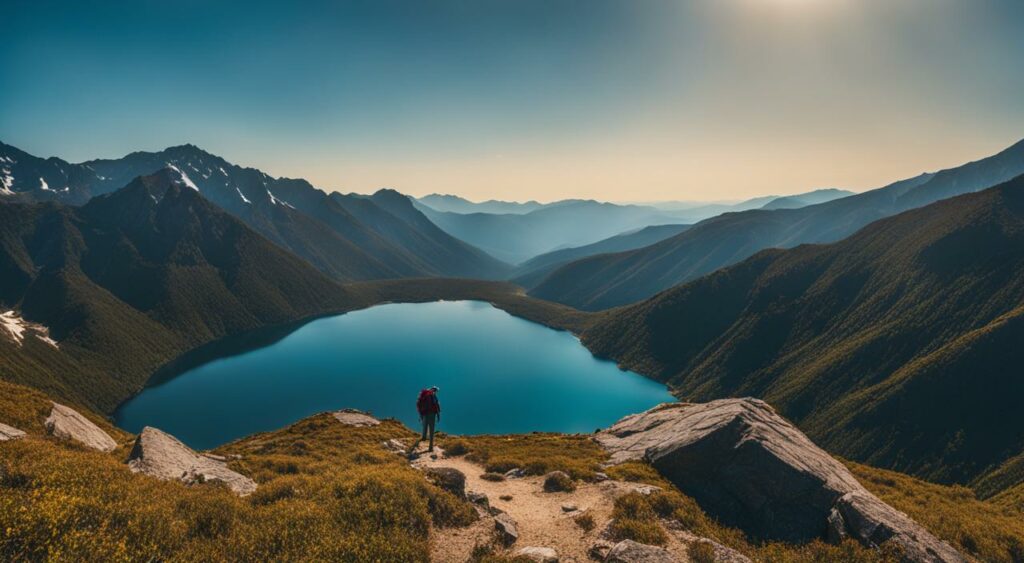
For backpacking enthusiasts looking for extended multi-day adventures, Georgia offers a plethora of options.
From challenging hikes to scenic loops, the state’s wilderness areas cater to backpackers of all levels.
Here are some of the best overnight backpacking routes and hikes in Georgia:
Jacks River Falls Trail
Located in the Cohutta Wilderness Area in North Georgia, the Jacks River Falls Trail is known for its stunning waterfalls and rugged terrain.
The 16-mile loop trail takes backpackers on a journey through dense forests, river crossings, and rocky terrain.
With multiple campsites along the way, backpackers can take their time and enjoy the natural beauty of this rugged wilderness area.
Blood Mountain Loop Trail
One of the most popular backpacking trails in Georgia, the Blood Mountain Loop Trail offers breathtaking vistas and challenging terrain.
The 20-mile loop trail in the Chattahoochee National Forest takes backpackers to the summit of Blood Mountain, the highest peak on the Georgia section of the Appalachian Trail.
With several campsites and shelters along the way, backpackers can take their time and enjoy the stunning views from this iconic trail.
Cumberland Island Loop Trail
For backpackers looking for a coastal adventure, the Cumberland Island Loop Trail offers a unique wilderness experience.
The 17-mile loop trail takes backpackers through pristine coastal forests and along secluded beaches on Cumberland Island, a barrier island off the coast of Georgia.
With several campsites and backcountry shelters available, backpackers can explore this remote island at their own pace.
Chattooga River Trail
The Chattooga River Trail is a challenging 31-mile point-to-point trail that runs parallel to the Chattooga River in North Georgia.
The trail takes backpackers through dense forests, rugged terrain, and stunning river vistas.
With limited campsites along the way, backpackers should plan accordingly and be prepared for a challenging adventure through this pristine wilderness area.
These are just a few of the many overnight backpacking adventures available in Georgia.
Whether seeking challenging terrain or scenic loops, Georgia’s wilderness areas offer something for every backpacking enthusiast.
Backpacking Beyond Georgia: Exploring the Region
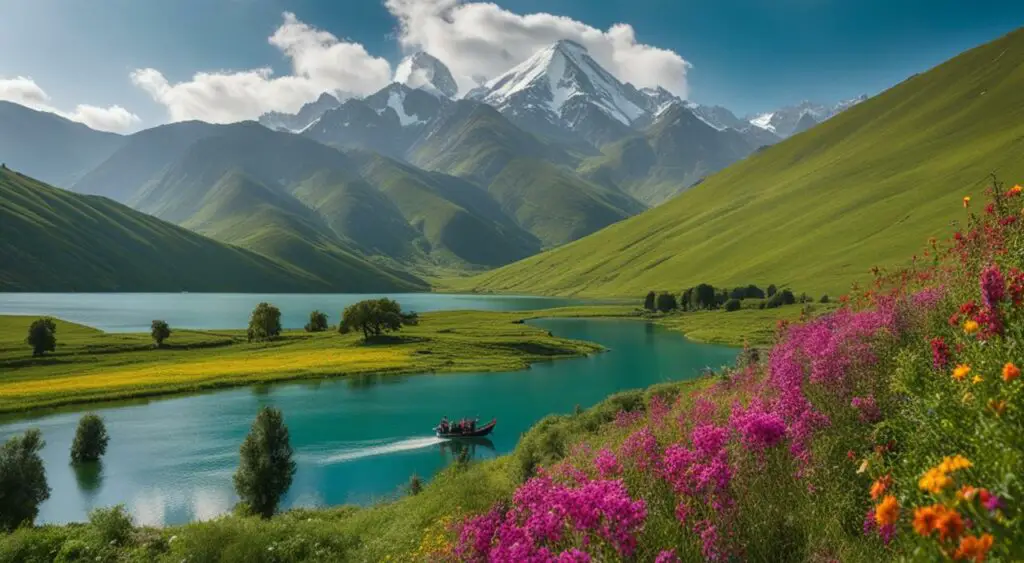
While Georgia offers a plethora of backpacking opportunities, some may want to extend their outdoor adventures beyond the state’s borders.
Fortunately, the region is home to several destinations that offer unique backpacking expeditions.
Backpacking Georgia and Armenia
One excellent option for backpackers is to explore neighboring Armenia. The country boasts a vast mountain landscape with several hiking trails, including the well-known Transcaucasian Trail.
The trail is part of a long-distance network connecting Armenia, Georgia, and Azerbaijan, providing backpackers with an extraordinary opportunity to explore the region’s amicable culture, history, and picturesque scenery.
One of the popular trails in Armenia worth exploring is the Dilijan National Park.
The park offers backpackers an incredible wilderness experience, with several camping sites and scenic hiking trails.
Another highlight is the historic Geghard monastery complex, a UNESCO World Heritage site and must-visit destination for visitors to the region.
Backpacking Georgia, Azerbaijan, and Beyond
For those seeking a more adventurous backpacking experience, Azerbaijan is also a compelling destination.
The country offers several unique hiking trails, including the Guba-Khinalig trail, passing through the traditional Khinalig village, known as the Caucasus Mountain’s highest inhabited village.
Backpackers can take on this challenging trail while enjoying breathtaking views of the Caucasus Mountains.
Other options to explore in Azerbaijan include the Goygol Lake, one of the country’s most picturesque natural wonders.
And the Tufandagh resort, which provides a unique adventure experience not found in other parts of the region.
Overall, backpacking in Georgia provides only a glimpse of the region’s stunningly diverse landscapes and cultural treasures.
With its neighboring countries offering unique and exciting backpacking experiences, outdoor enthusiasts can expand their adventure beyond Georgia to explore the region’s vast wilderness truly.
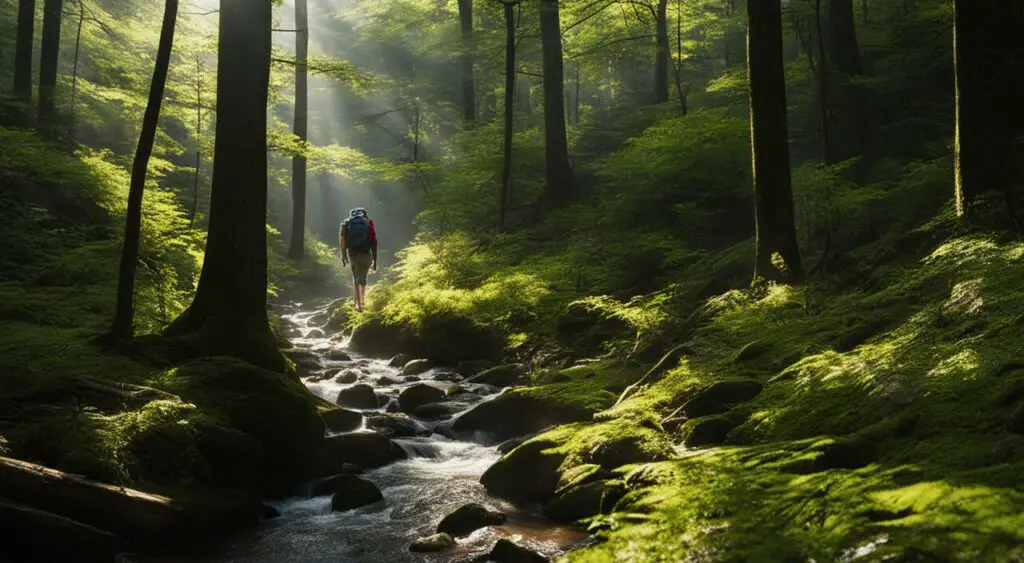
Conclusion
All in all, Georgia offers an unforgettable backpacking experience for adventurers and nature enthusiasts alike.
With its stunning peaks and tranquil lakes, the state boasts some of the most scenic trails in the country.
From well-known spots like Anna Ruby Falls and Cloudland Canyon to hidden gems in North Georgia, the state offers diverse opportunities for backpackers of all levels.
For those seeking multi-day backpacking adventures, the state offers some of the best overnight backpacking routes and hikes.
And with neighboring countries like Armenia and Azerbaijan, there are further opportunities to extend backpacking adventures beyond Georgia’s borders.
Before embarking on a backpacking trip in Georgia, proper planning is key, including guidance from reliable resources and reviews.
Major cities like Atlanta and Tbilisi offer valuable insights and resources for backpackers.
From gear and safety tips to local insider recommendations, backpacking in Georgia is an adventure not to be missed.
So pack your bags, put on your hiking boots, and explore the breathtaking beauty of Georgia’s trails and landscapes.

FAQ
-
What are the best backpacking trails in Georgia?
Some of the best backpacking trails in Georgia include the Appalachian Trail, Anna Ruby Falls, Cloudland Canyon, and various state parks like Amicalola Falls and Providence Canyon.
-
Is there good backpacking in North Georgia?
Yes, North Georgia offers a paradise for outdoor enthusiasts with a multitude of backpacking opportunities. The region boasts stunning mountain landscapes, state parks, and hiking trails.
-
What are the must-visit natural wonders in Georgia for backpackers?
Anna Ruby Falls and Cloudland Canyon Park are two iconic destinations for backpackers in Georgia. These natural wonders offer beautiful hiking trails and scenic viewpoints.
-
Can I hike the Appalachian Trail in Georgia?
Yes, the Appalachian Trail passes through Georgia, providing backpackers with a chance to experience a portion of this scenic masterpiece. There are notable waterfalls and breathtaking views along the trail.
-
Which state parks in Georgia are ideal for backpacking?
Georgia is home to numerous state parks that offer excellent backpacking opportunities. Some of the best state parks for backpackers include Amicalola Falls State Park and Cloudland Canyon State Park.
-
How should I plan my backpacking adventure in Georgia?
Proper planning is crucial before embarking on a backpacking trip in Georgia. Make sure to explore Georgia hiking guides, obtain trail maps, and check driving directions. Online resources for reviews can also be helpful.
-
What tips and recommendations do you have for backpacking in Georgia?
When backpacking in Georgia, it’s important to have the right gear and prioritize safety. Additionally, consider exploring major cities like Atlanta and Tbilisi, as they offer unique experiences for backpackers.
-
What are the best overnight backpacking adventures in Georgia?
For unforgettable multi-day experiences, consider the best overnight backpacking routes in Georgia. These include scenic loops and challenging trails that provide extended wilderness experiences.
-
Can I extend my backpacking adventures beyond Georgia?
Yes, while this article primarily focuses on backpacking in Georgia, neighboring countries like Armenia and Azerbaijan also offer backpacking options for those seeking further exploration.

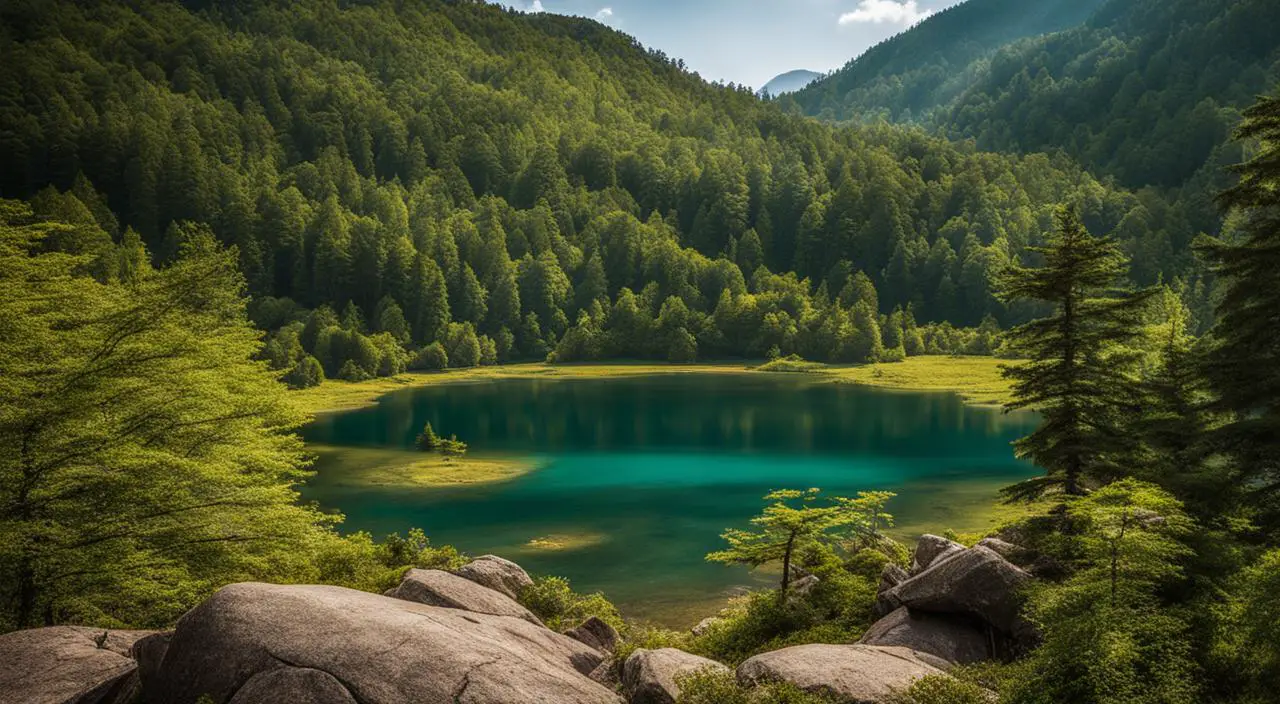


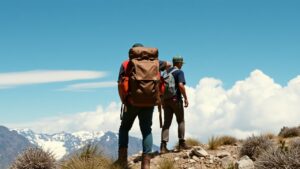


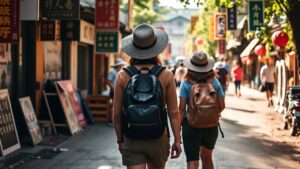
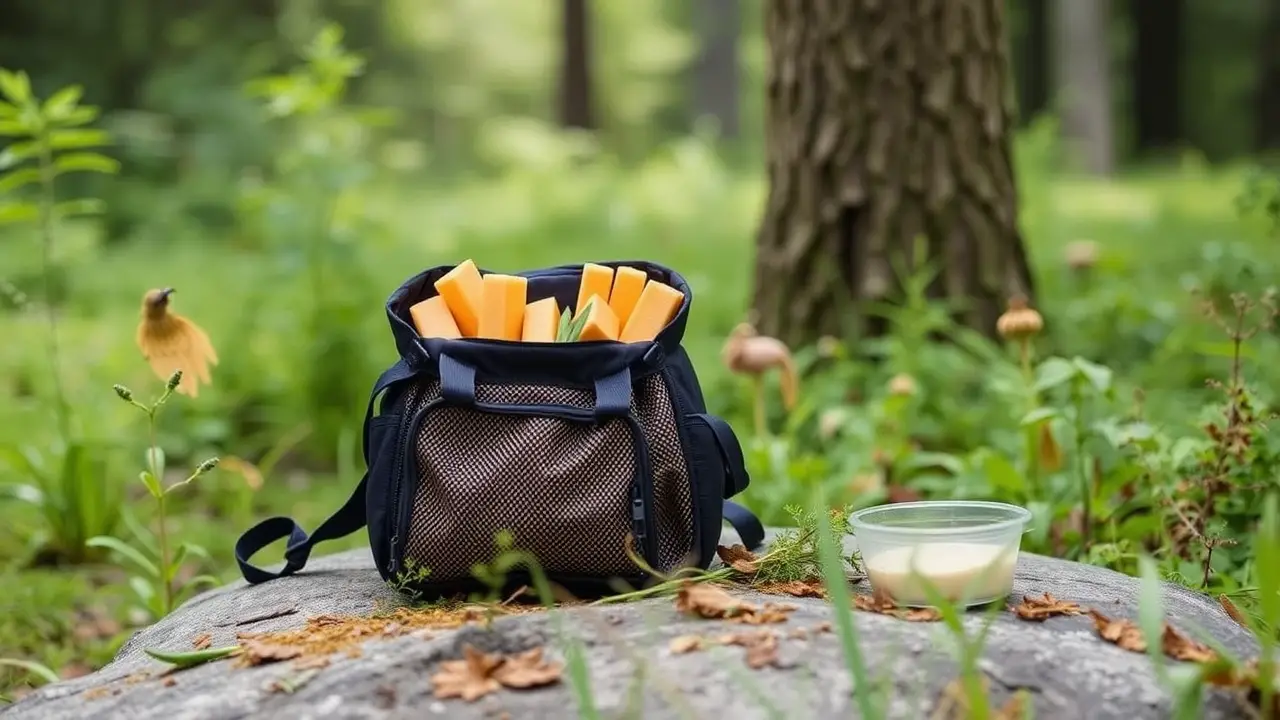
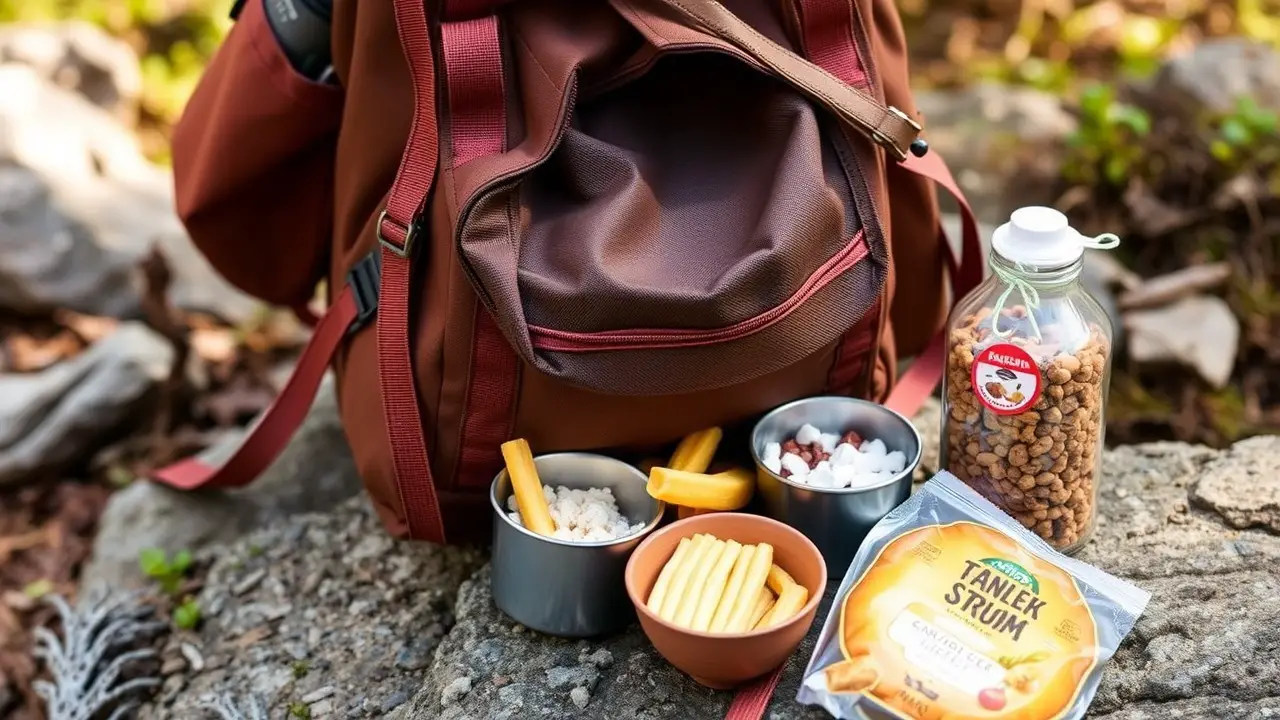
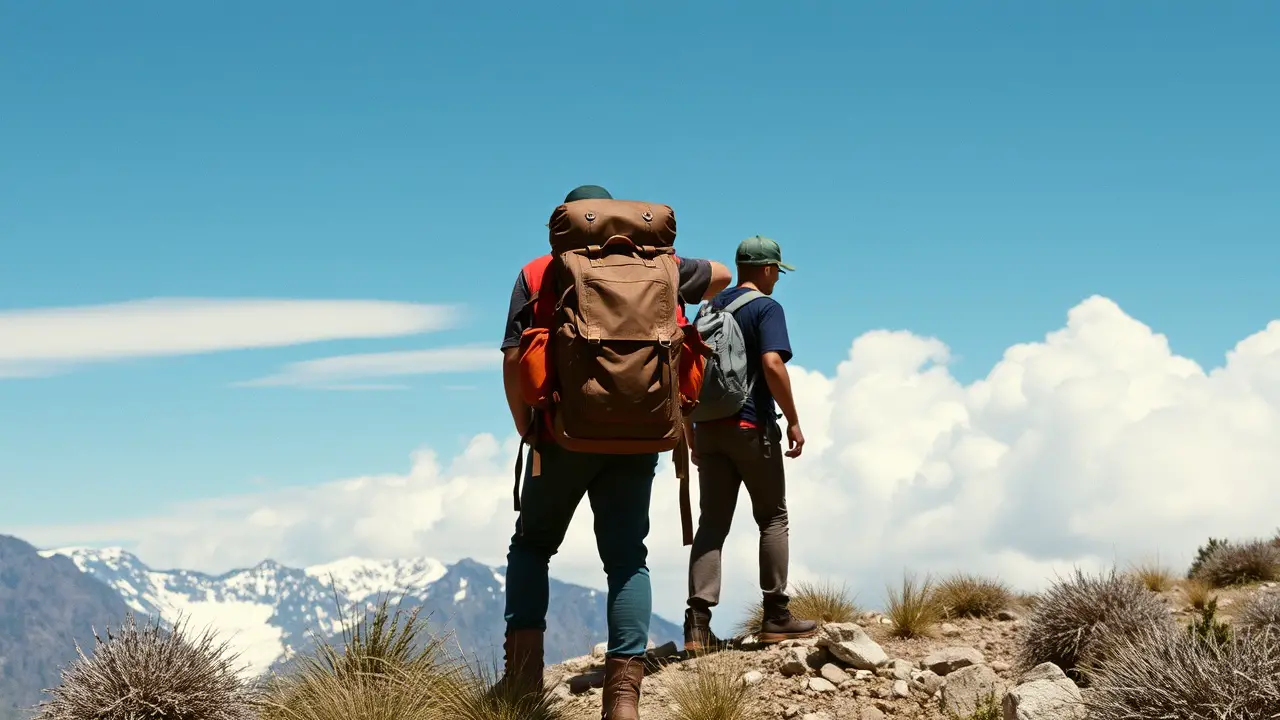
Leave a Reply